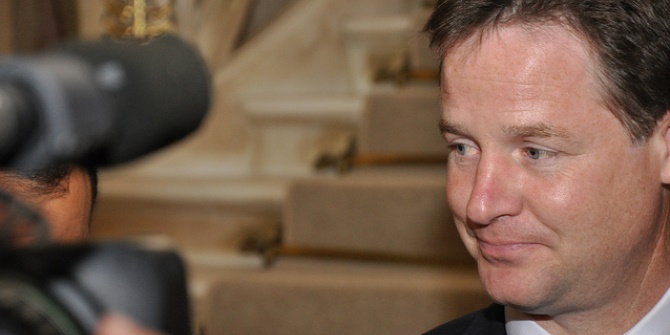 Eunice Goes analyses Keir Starmer’s first conference speech as Labour leader. She argues that the keynote address clarified the distinctiveness of his leadership style, and presented Starmer as a serious Prime Minister-in-waiting.
Eunice Goes analyses Keir Starmer’s first conference speech as Labour leader. She argues that the keynote address clarified the distinctiveness of his leadership style, and presented Starmer as a serious Prime Minister-in-waiting.
Keir Starmer used his virtual speech to the 2020 party conference to tell voters that Labour is now ‘under a new leadership’ that is ‘serious about winning’ the next election. He also made clear that he is ready to do what it takes to take Labour ‘out of the shadows’, even if that involves embracing personality politics and placing patriotism at the centre of the party’s message.
Starmer has been Labour leader for only five months but he has already established a reputation as a credible and competent leader of the opposition. Opinion polls routinely put him ahead of the Prime Minister Boris Johnson in the credibility stakes, and the media has often praised his competence and famous forensic approach to opposition politics.
This is a welcome new territory for Labour – Starmer’s predecessors, Jeremy Corbyn and Ed Miliband, struggled to endear themselves to the average voter – so it is no surprise that he is making the most of it. In fact, judging by some killer lines used in this speech, the Labour leader is enjoying his new role as the most popular politician in British politics. His attack on Boris Johnson was ruthless, personal and, given it came from the impeccably well-mannered Starmer, was also somewhat unexpected:
While Boris Johnson was writing flippant columns about bendy bananas, I was defending victims and prosecuting terrorists. While he was being sacked by a newspaper for making up quotes, I was fighting for justice and the rule of law.
In short, while the COVID-19 crisis demonstrated that Johnson is ‘not up to the job’, Starmer presented himself as the grown-up, serious, with ‘no time to waste’ Prime Minister-in-waiting. Judging by the firmness of his delivery, we can expect these lines to be repeated time and time again for as long as Johnson remains Prime Minister.
Starmer’s embrace of ‘personality politics’ also involved a surgical distancing from the legacy of Jeremy Corbyn. Not only did he say that Labour deserved to lose the 2019 election, Starmer also promised that ‘never again will Labour go into an election not being trusted on national security, with your job, with your community and with your money’. If this brutal take-down did not clarify the distinctiveness of his style, Starmer decided to wave the patriotic flag in a way that Corbyn never did and which spoke directly to the Red Wall voters.
Instead of dressing his patriotism in the clothes of internationalism and multiculturalism like Ed Miliband had done during his leadership, Starmer offered an unashamedly traditional approach. He tickled Red Wall patriots by using his knighthood to hint at his admiration for the monarchy and the Queen. As he said, taking his parents to Buckingham Palace to see him get knighted for his services to criminal justice had been ‘the proudest moment of their lives’. In lines which were drafted to appeal to the patriotic hearts of former Labour voters, he also made a strong defence of family values, promised ‘security’ on myriad areas, and sounded grateful for ‘a country that has given me so much’.
But there was also a nod to New Labour’s optimistic and futuristic version of patriotism. Like Tony Blair’s promise of a ‘New Britain’ and ‘young country’, Starmer’s version of patriotism will sound, he promised, ‘like the future arriving’. There were equally positive and deliberate references to Harold Wilson and to his ‘white heat’ revolution, which suggest that Labour’s ‘new leadership’ will pragmatically do what it takes to be in power again.
The vagueness of this vision of the future will surely disappoint Labour supporters who fear that the party will lose its radical edge. But Starmer has plenty of time to plot that forward-looking 2024 manifesto, as well as plenty of trust-building exercises to complete if he wants to turn those positive-looking opinion polls into a majority of seats.
_________________
 Eunice Goes is Professor of Politics at Richmond University.
Eunice Goes is Professor of Politics at Richmond University.







